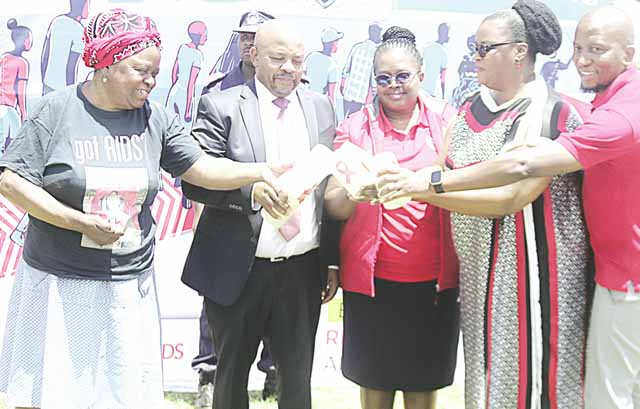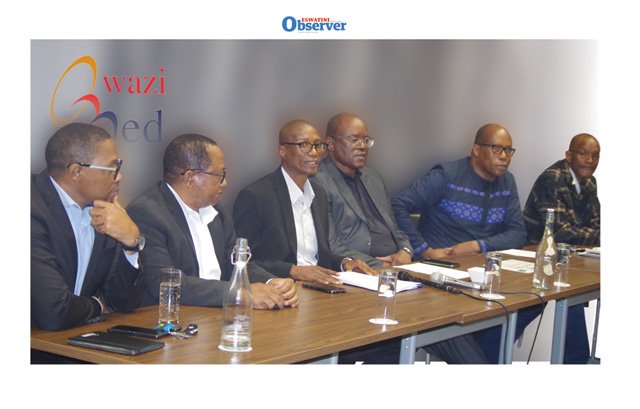By Musa Simelane | 2024-11-02

Persons with disabilities face a heightened risk of HIV infections in the country as they are vulnerable to sexual violation and are largely excluded from HIV/AIDS educational outreach programmes.
This highlight was made by Bongani Makama, President of the Federation of Organisations of Disabled Persons in Swaziland (FODSWA) at the World AIDS Day 2024 commemoration launch at St Joseph’s Primary School (Mzimpofu) yesterday.
This year’s global theme is ‘Take the Rights Path’, which has been localised to: Nkwe! Eswatini Take the Rights Path to End AIDS.
He said females, especially those with cerebral palsy, have a high HIV prevalence since they are taken advantage of by shady elements in the communities, who capitalise on the fact that they cannot talk and have physical and cognitive challenges.
This leads to cases of sexual assault and, ultimately, increased rates of HIV transmission. Some even end up pregnant unknowingly, and cannot communicate effectively or identify the culprits.
“Persons with disabilities are also more vulnerable to HIV and AIDS due to a range of factors, including limited access to education and healthcare, heightened discrimination, and, often, a lack of tailored outreach and support. This is particularly concerning, as persons with disabilities represent a population that, historically, has been under served in health programmes,” explained Makama.
He stated that the urgency of inclusive HIV and AIDS response on people with disabilities (PWD) was vital for the country. He acknowledged that Eswatini, like any other country, had made remarkable progress in the fight against HIV and AIDS. Yet, for many PWDs, accessing information, treatment and care remains a significant challenge. Despite the progress made, too many barriers still exist for those who should not be excluded.
The president added that national success in tackling HIV and AIDS can only be complete when it is inclusive—when all individuals, regardless of ability, can access the necessary support and resources.
“The kingdom has achieved the three 95, but I am confident that if PWDs were included it would go up to 100. By ensuring that persons with disabilities in Eswatini have full access to HIV and AIDS services, we take an essential step towards a just, compassionate and resilient society,” Makama stated.
He also mentioned that there were both structural and societal barriers that were a challenge to the population group in question. Physical inaccessibility in healthcare facilities, lack of disability-friendly information, and the stigma surrounding disability and HIV, all play a role in limiting access.
Research
For individuals with hearing, visual or cognitive impairments, existing communication channels may not be sufficient, and many healthcare providers are not adequately trained to accommodate the specific needs of PWDs.
Meanwhile, National Emergency Response Council on HIV and AIDS (NERCHA) Director Dr Nondumiso Ncube, in her remarks, said the council noted the concerns that have been raised by FODSWA on segregating research data that will clearly state the HIV prevalence among persons with disabilities.
She said segregating HIV research data for persons with disabilities was indeed crucial for a comprehensive understanding of how the virus impacts diverse populations. Historically, research on HIV has focused mainly on the general population, often overlooking the unique challenges and needs faced by individuals with disabilities.
“The importance of providing HIV information to persons with disabilities cannot be overemphasised. Persons with disabilities are often marginalised and face numerous barriers when accessing healthcare services, including information about HIV prevention, testing and treatment,” acknowledged the director.
She said this demographic was at risk due to factors such as limited access to education, dependence on caregivers and social isolation. As a result, tailored efforts to address these challenges are critical. Ncube pointed out that NERCHA has an information centre and as an organisation, it would make sure that information available at the info centre is accessible for everyone, including persons with disabilities.
‘We need an inclusive environment’
Minister of Health Mduduzi Matsebula has noted a need to create an all-inclusive, supportive and an enabling environment that respects rights to access healthcare services for all Emaswati.
He made assertions at the World AIDS Day 2024 commemoration launch at St Joseph’s Primary School (Mzimpofu). He said hosting the launch at the school with the focus of protecting the rights of persons with disabilities, aligned well with this year’s World AIDS Day global theme which says, ‘Take the Rights Path’.
This global theme has been localised to: Nkwe! Eswatini Take the Rights Path to End AIDS, which translates to Nkwe! Asihloniphe emalungelo, sincobe iAIDS Eswatini.
He clarified that this theme highlights that the journey to end HIV and AIDS is a journey of social justice and human rights as it is one of medical progress. The link between human rights and HIV prevention, treatment and care is undeniable.
“To reach the goal of ending AIDS, we need to create an inclusive, supportive and enabling environment that respects rights to access healthcare services for all Emaswati.
Stigma
Human rights violations may include stigma and discrimination, abuse, and criminalisation of people living with HIV and people most affected by HIV,” said the minister. Furthermore, he said rights violation makes people more vulnerable to HIV and less able to access HIV prevention services, testing and lifesaving treatment. Therefore, he said, protecting, promoting, respecting and fulfilling people’s human rights was an essential aspect of an effective HIV response.
The minister acknowledged that persons with disabilities often face unique challenges that could increase their vulnerability to HIV and AIDS, such as limited access to healthcare services, discrimination and societal stigma. For Eswatini to comprehensively and effectively address HIV and AIDS related issues among all populations, it is essential to adopt an inclusive approach that considers the rights and needs of all persons.
share story
Post Your Comments Below
Health officials have reported a significant decrease in new HIV infections among men, in...
Social media users have reacted with shock and sorrow to the death of former Mhlume Unite...

Sisonkhe FC ……........….. (0)2
Mpendulo 55th, Thab...

THE recent turn of events at SwaziMed has underscored deep-rooted governance challenges that thre...
All material © Swazi Observer. Material may not be published or reproduced in any form without prior written permission.
Design by Real Image Internet